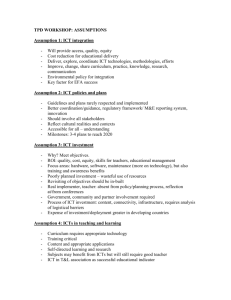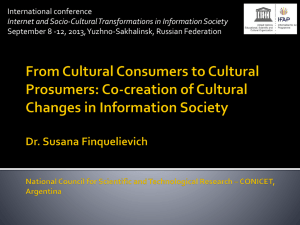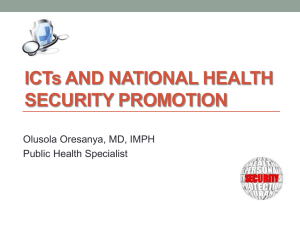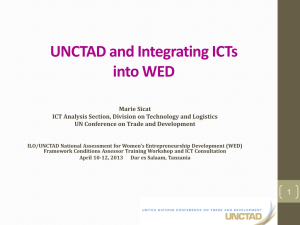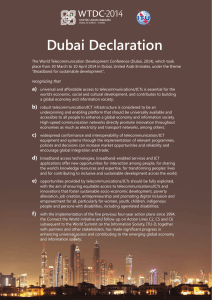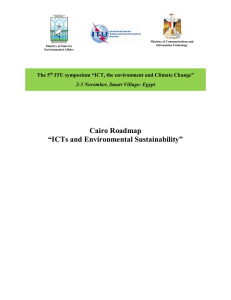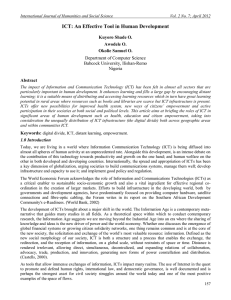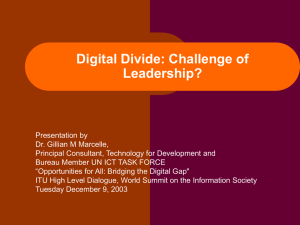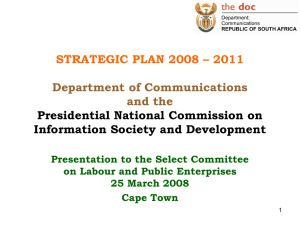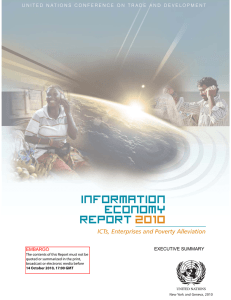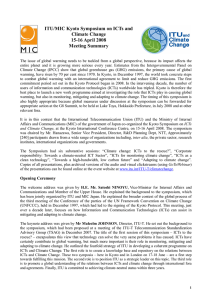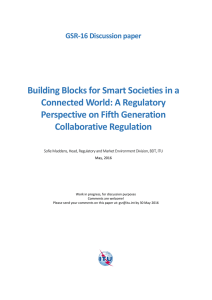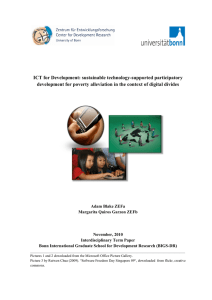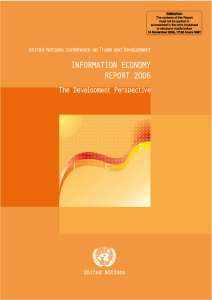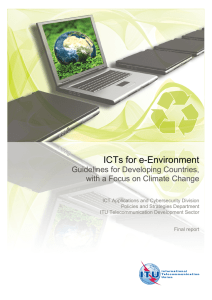Presentación de PowerPoint
advertisement
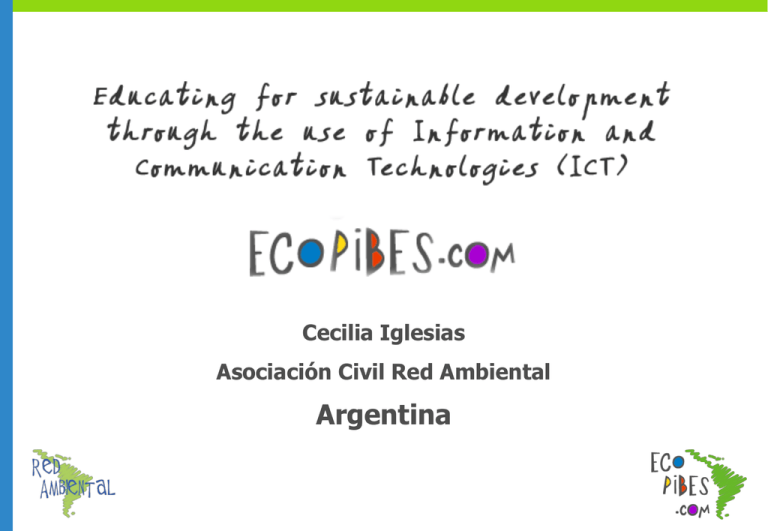
Cecilia Iglesias Asociación Civil Red Ambiental Argentina I was born in Argentina, a country full of beautiful places… although some of these ecosystems are under significant pressure from various types of human activities. Despite the abundant available resources, millions of people survive daily life in extreme poverty. This situation causes a social, economic, cultural, political and environmental crisis. Everything was falling apart. I wanted to help, but organizations did not take me seriously. I was compelled to start my own small projects at school. Through these experiences, I found my purpose and decided to pursue a career in the environmental field. In 1999, during my last year of college, I was working as a intern for an environmental consulting firm. I wasn’t really making a difference, not even a tiny one. “Every single one of us has to do their part to plant the seed for change” Agustina, 11 years old, Argentina. It was clear to me that I needed to find my “part” I believed that education was the key to sustainable development And suddenly the Internet arrived like an earthquake, transforming the way everything was done. I was enamored with ICT!!! I could not resist exploring what could happen if I used these new technologies for environmental education. I registered the ecopibes.com domain and the project was born. After graduating with honors, I got laid off! It was both a challenge and a opportunity: I could either seek a similar job or I could devote more time to my project. “Let's get to work!!!!!” Juliana, 9 years old, Argentina. What is Ecopibes? Environment EcoPibes is an educational project SD for sustainable development (environmental, social, and economic), Education for Spanish-speaking children and adolescents based on the use of information and communication technologies. ICT Accessibility What are we trying to achieve? The objective of the project is it to enrich the education of children and adolescents so they can: understand local, regional, and global environmental problems, take part in community development, assume leadership and construct their own future, respect and value diversity in all ways possible, be honest, creative, open-minded, critical, peaceful and solidary, and commit to a sustainable development for all. Why is it important? Today we have sufficient evidence of the degradation we are causing to the planet, and furthermore, how this degraded environment is affecting our daily lives. We need to commit to a different path, one that works for everyone, everywhere, and for all time. Change is certainly necessary and I believe education is the ultimate enabler of change. Old problem… Environmental education in Latin America has many barriers, among them is the lack of educational resources. We had 2 choices: Use traditional natural science books, or Use environmental books developed in the global north. Neither of them adequate to fulfill the need. Old problem… new opportunity The Internet arrived providing unparalleled access to information with better tools to share it. It’s arrival changed the role people have on their own educational process. Even though we had access to a gigantic library, resources were not locally relevant. We were learning about problems that they were not causing nor being affected by. We were not learning about the issues that have consequences in all of our lives. Schools are teaching about the Panda Bear! Environment Old problem… different approach Through ICTs, I could promote change, in order for concerns to evolve into local action. SD Education ICT Accessibility Locally relevant contents Capacity building Equal access Equipment and softwares Global team, worldwide partners By using ICT we can pool together the knowledge, experiences, and commitment necessary to achieve sustainable development. We use ICT to create a unique team as well as to find our partners. Content Photos Images Photos volunteers volunteers volunteers Content volunteers Sounds Support Funds Content Content Funds Support Content Photos Content How else are ICTs enabling our work? Let me tell you what I think EcoPibes would be without ICTs… We have invested less than UDS 3,000 in 6 years. (Creativity and networking can be extremely cost-efficient!!!) With that kind of money we could probably have enough to print a few copies of a nice gigantic book that only certain children in the area would be able to buy. Instead, today EcoPibes… ...is the largest sustainable development website it exists for Spanish-speaking children and adolescents; ...has more than 30,000 users a month, from 29 different countries, (1 of every 4 of them includes our website to his/her Favorites); ...is a network for intercultural exchange of information and experiences; ...is a channel through which we promote other organizations and projects; ...is a living and evolving project that can reinvent itself if needed; EcoPibes also… ...received several safety labels and awards; ...has attained a great presence in search engines (number 2 of 15,100,000 results) ...is highly recommended by intergovernmental organizations, governments, NGOs, schools, the media, environmental networks, etc.; In 2004, I received the Outstanding Young Persons of Argentina (TOYP) Award, which “recognizes young people who excel in their chosen fields and exemplify the best attributes of young people.” In my case, I received this award for environmental leadership. Challenges during our inception For the first couple of years, EcoPibes was my contribution to environmental education, and my primary donor was my own wallet… However, I increasingly started having time conflicts. I needed to work in order to pay for the project, which in effect left me with no time to work on the project. I realized that I was not achieving a core competency of a successful organization: economic sustainability. I started looking for partners… But first I needed to create an NGO (jumping over hurdles!) I soon realized that having a good project was not enough. Environment Global Issues Education Education for all Children Poverty alleviation Youth Youth employment ICTs Access to ICTs Argentina (Out of the map) Most common operating cost are usually not covered and salaries are out of the question. “Why don’t you start an organic farm? That we can help you with” “Why don’t you come back when the project is mature” “Sorry, the project has to be genuinely youth-led” Our project does not fit the mold We recently won a Youth Projects Contest organized by UNEP and the Secretariat of Environment in Argentina A new project we are working on was selected for UNDP funding Hopefuly, we will get the attention of new donors here!!! My vision for the project I envision EcoPibes as a readily accessible tool for every child or adolescent who is willing to learn about the environment. I want EcoPibes to be able to transform this curiosity into a lifetime commitment to environmental protection and sustainable development. I want EcoPibes to help them understand the systemic nature of reality so they can make decisions with a profound understanding of their consequences. I aspire that EcoPibes will help empower children and adolescents so they can become environmental leaders today and in the future. I hope that EcoPibes survives in perpetuity. In order to achieve this we will… Continue to include new contents Improve interactivity Create an EcoPibes Advisory Council Lauch collaborative projects Search for new partnership opportunities Create a Network of Sustainable Classrooms We could also translate EcoPibes into English and Portuguese. Search for info Create or adapt info Communicate info Share experiences Build Knowledge We want to continue exploring all the opportunities ICTs have to offer so that we can hit the bull’s eye. Our major constraint has always been access to funds and partners None of us get paid for what we do, creating time conflicts. We could never pay for someone to solve our programming flaws. We have missed opportunities to provide interesting solutions. We cannot satisfy some of our users´demands. However, the lack on money has also created interesting challenges that took us beyond conventional approaches. We learned to focus on what was needed, not wasting any effort on things that others were already doing. Therefore, anytime we are able to find an useful educational resource, we help our users get to it. This has been a good basis for institutional collaboration and partnership building. We always have to search for cheaper ways to do things, sometimes resulting in a very innovative solution to problems. Our games are a good example!! We learned to ask for help. Everything on EcoPibes (images, sound recordings, contents, photographs, etc.) have been donated by people and organizations. We try to satisfy our users’ needs by maximazing our time. For example, at the moment we cannot answer all e-mails, so we are focusing on strengthening our network. Since we could not pay for someone to program things for us, we had to familiarize ourselves with the technologies. I learned everything I know about ICT by using ICT. We continue to look for partners to overcome our major barrier: the need to split our time between our project and a paid job. A challenge that has presented itself is the increasing complexity of my life combined with the organization’s growth. I am pulled in many different directions, as I have to play many roles. Civil Society Environmental Project LeaderRepresentative Consultant Youth University Engagement Fund Raiser teacher Activist Mother, daughter, sister, friend, etc. “Remember to start with yourself, and then you can change everything you want” Leticia, 10 years old, Mexico. IGOs, Governments, adult-led NGOs, the private sector, etc. should listen to young people and learn from their experiences. In the process of making financial policy, development agencies should consider both the possibilities and the limitations young people have. I would like to see a stronger commitment to economicaly support youth projects, both small and large ones, with a focus on the global south. To promote youth projects based on the use of ICTs, special attention should be given to help finance their technological needs. Award and recognize young people investing in development, in order for local institutions to take them seriously and support their projects. Keep policies flexible to assure room for innovation. It is important to remember that often the best projects do not fit the archetypal mold. That is exactly why they are so unique! Thank you! www.ecopibes.com
